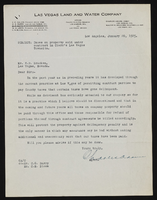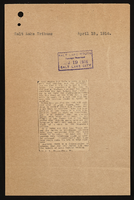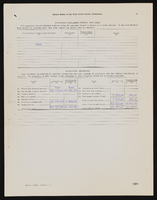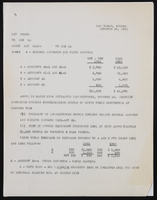Search the Special Collections and Archives Portal
Search Results
Adela Montes de Oca oral history interview
Identifier
Abstract
Oral history interview with Adela Montes De Oca conducted by Laurents Banuelos-Benitez on December 06, 2018 for the Latinx Voices of Southern Nevada Oral History Project. Adela Montes De Oca discusses her early life in Mexico and describes her childhood as a happy and festive one. As an adult, Montes De Oca aspired to be a teacher, but could not due to financial hardship. She shares how this affected her life and influenced her career choice, instead becoming a social worker. Montes De Oca recalls what she learned after spending twenty years working with children in Mexican orphanages. In 2003, Montes De Oca decided to move to Las Vegas, Nevada to join her family who had immigrated years prior. She discusses her immigration and her new career in Las Vegas. She shares her views on the importance of unions and her experiences working with the Culinary Workers Union Local 226 as an event organizer and union manager.
Archival Collection
Margarita Rebollal oral history interview
Identifier
Abstract
Oral history interview with Margarita Rebollal conducted by Marcela Rodriguez-Campo and Barbara Tabach on February 28, 2019 for the Latinx Voices of Southern Nevada Oral History Project. Margarita Rebollal is a lifelong community organizer and advocate for Latinx civic engagement and rights. She shares what it was like to grow up in Ponce, Puerto Rico and shares her childhood memories growing up on the island with her siblings. Rebollal also discusses the death of her father and the eventual move of her family to New York City, New York. She also recalls her education and teen years. Later, she would move to California, and eventually find her way to Las Vegas, Nevada in 1996. Rebollal discusses her passion for civic engagement and the many years serving the community, being most well-known for her role in founding the Puerto Rican Association of Las Vegas and the Hispanic International Day Parade of Nevada. Rebollal also discusses her campaign for the Ward 1 Las Vegas City Council seat.
Archival Collection
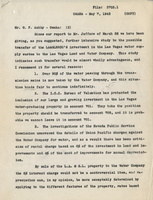
Letter from W. H. Hulsizer (Omaha) to G. F. Ashby (Omaha), May 7, 1942
Date
Archival Collection
Description
Hulsizer enumerated the many financial and political reasons that the water producing lands controlled by the Los Angeles & Salt Lake Railroad Company should be sold to the Las Vegas Land and Water Company.
Text
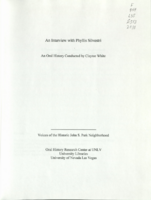
Transcript of interview with Phyllis Silvestri by Claytee White, January 11, 2010
Date
Archival Collection
Description
As a young woman, Phyllis Silvestri made the adventurous decision to move to the United States. She was bom in Canada and lived there until her early 20s. Over the next few years, Phyllis and her friend Mona logged many miles, worked and visited several states. By 1953, Phyllis had met and married Vincent Silvestri, who worked at Bingo Palace, now the Sahara Hotel and Casino. Soon they had their first child and had bought a home on Santa Rosa. A few years later they were building a new home in the John S. Park area. She proudly recalls her husband's attention to details such as including lots of built-in features and a bomb shelter that represents the era. Phyllis talks fondly of the neighborhood, but also recalls her children not being allowed to play with some of the neighborhood children because they were of Italian ancestry.
Text
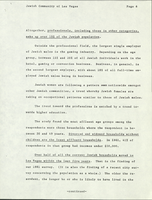
Article, The Jewish Community of Las Vegas by Jerry Countess, September 1987
Date
Archival Collection
Description
In this essay, Jerry Countess provides narrative context for a demographic study of the Jewish population in Las Vegas, and addresses the services and community needs revealed by the study and the growing Jewish population.
Text

